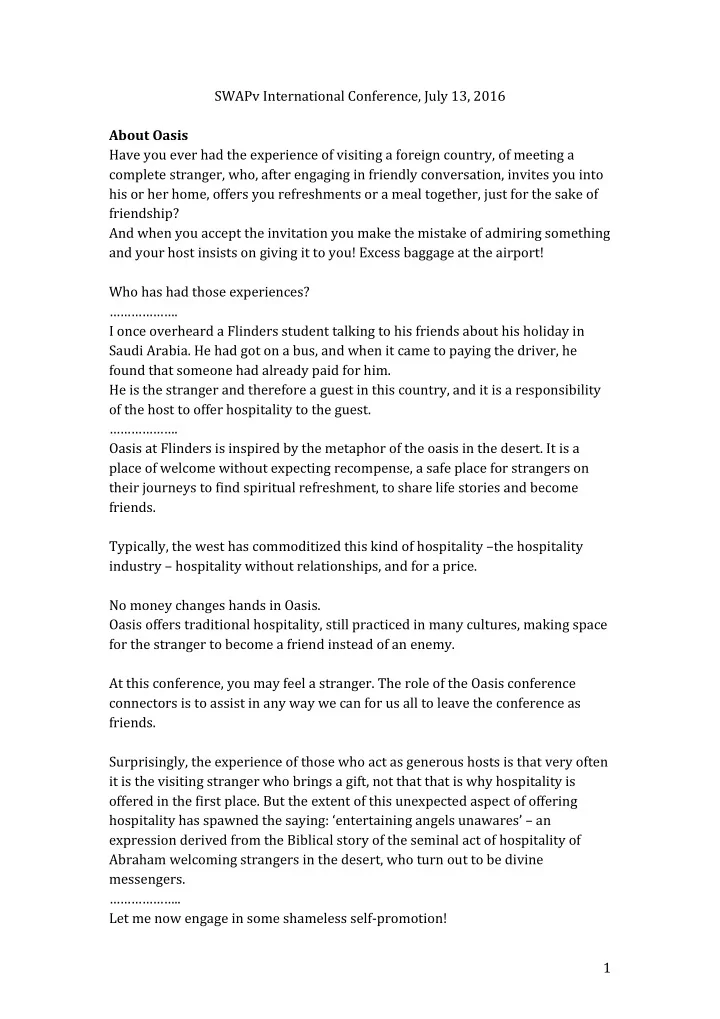

SWAPv International Conference, July 13, 2016 About Oasis Have you ever had the experience of visiting a foreign country, of meeting a complete stranger, who, after engaging in friendly conversation, invites you into his or her home, offers you refreshments or a meal together, just for the sake of friendship? And when you accept the invitation you make the mistake of admiring something and your host insists on giving it to you! Excess baggage at the airport! Who has had those experiences? ………………. I once overheard a Flinders student talking to his friends about his holiday in Saudi Arabia. He had got on a bus, and when it came to paying the driver, he found that someone had already paid for him. He is the stranger and therefore a guest in this country, and it is a responsibility of the host to offer hospitality to the guest. ………………. Oasis at Flinders is inspired by the metaphor of the oasis in the desert. It is a place of welcome without expecting recompense, a safe place for strangers on their journeys to find spiritual refreshment, to share life stories and become friends. Typically, the west has commoditized this kind of hospitality –the hospitality industry – hospitality without relationships, and for a price. No money changes hands in Oasis. Oasis offers traditional hospitality, still practiced in many cultures, making space for the stranger to become a friend instead of an enemy. At this conference, you may feel a stranger. The role of the Oasis conference connectors is to assist in any way we can for us all to leave the conference as friends. Surprisingly, the experience of those who act as generous hosts is that very often it is the visiting stranger who brings a gift, not that that is why hospitality is offered in the first place. But the extent of this unexpected aspect of offering hospitality has spawned the saying: ‘entertaining angels unawares’ – an expression derived from the Biblical story of the seminal act of hospitality of Abraham welcoming strangers in the desert, who turn out to be divine messengers. ……………….. Let me now engage in some shameless self-promotion! 1
I tell the story of how Oasis evolved at Flinders over the last 20 years in my book ‘An Improbable Feast’. I’d be delighted to sell you a copy for $20 over afternoon tea. Pick up a copy and have a skim, and see if it of interest. It is the story of how a culture of religious violence in the Religious Centre at Flinders was gradually disempowered in a most unexpected way, gradually replaced by what we later discovered was traditional hospitality, as the Christian chaplains invited appropriate representatives of other religious communities to join them in serving the wider university community together. This started by inviting them to lunch together, and this practice has continued once a week ever since. The book is an exploration of the spiritual dynamic of traditional hospitality as an antidote to exclusion and the spiritual and emotional bullying of self-centred fundamentalisms, religious or secular. By sharing our lives together each week, we discovered we had such a lot in common, and without trying to solve our differences we found that: 1. the sharing of food together is central to most indigenous and world religions. 2. The practice of traditional hospitality is common among most indigenous and world religions. 3. That the spiritual (love, faith, kindness, compassion, hope, beauty, forgiveness …) is inherent and intrinsic to the human person, whereas religion is humanly constructed to nourish these attributes. 4. That religion and culture are inseparably intertwined – so multiculturalism includes the multi-religious. 5. Pluralism is the key domain for exploration. Pluralism , according to the Harvard Pluralism Project involves: 1. commitment and energetic engagement with diversity 2. understanding across lines of difference 3. relational, appreciative dialogue Oasis adds to Harvard: 1. the direction of pluralism is toward human flourishing 2. the mode of engagement with diversity is: a. hospitality as the creation of free, friendly, appreciative space b. ‘other’ centred c. a sharing of worlds, while maintaining integrity 3. holistic a. cross disciplinary b. a local, regional and global movement of learning and caring 2
c. wellness, not sickness d. creating culture, not ‘fixing it’ 4. Problems a. western reductionism to a hegemonic materialist narrative b. not institutionally understood c. ‘self-centred’ authoritarian, hierarchical management structures Conclusion We are in a time of paradigmatic transition from the materialist, rationalist to the post-modern. We should expect a last gasp effort by those invested in the modernist, rationalist and materialist paradigm to resist these changes and to expect authoritarian violence to protect self-interest. Conviction Travelling on holidays through Europe these last five weeks, and witnessing the traumatic effects of war, generations on, and the sophistication and massive investment of left and right ideologies to control the lives of its citizens… The spiritual holds the key to well being and the motive and attitude for a well being culture. Paul Kelly summarised it as Love is the Law, the Law is Love . Michael Leunig has commented, ‘it is as simple and as difficult as that. 3
Recommend
More recommend